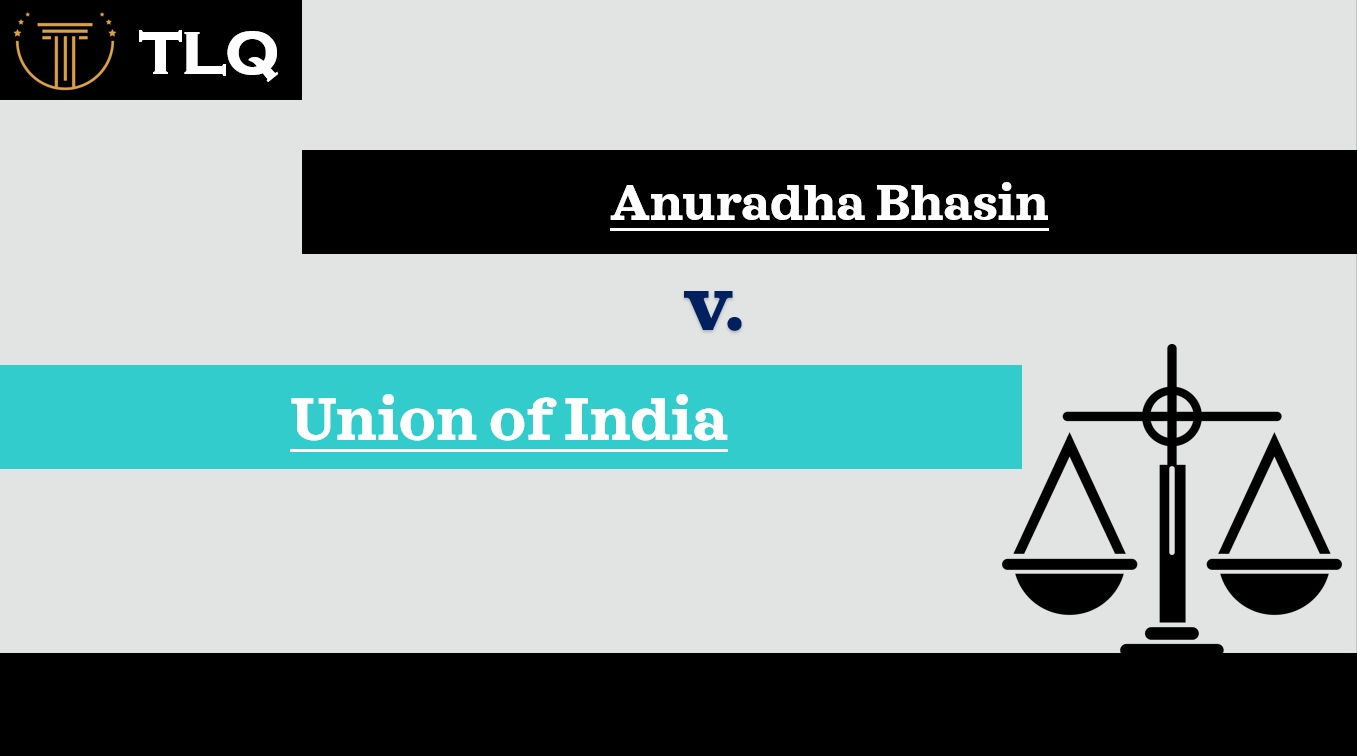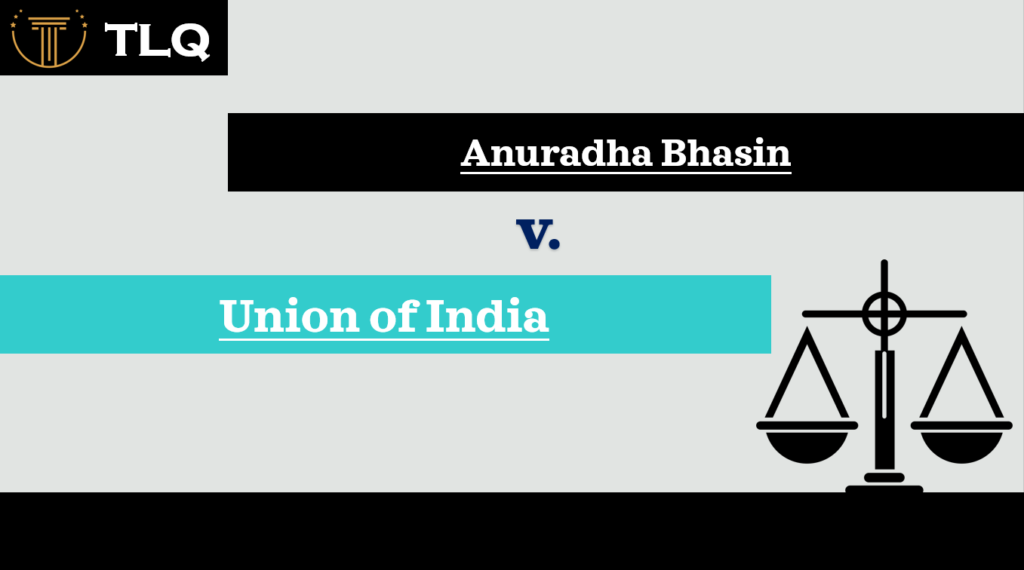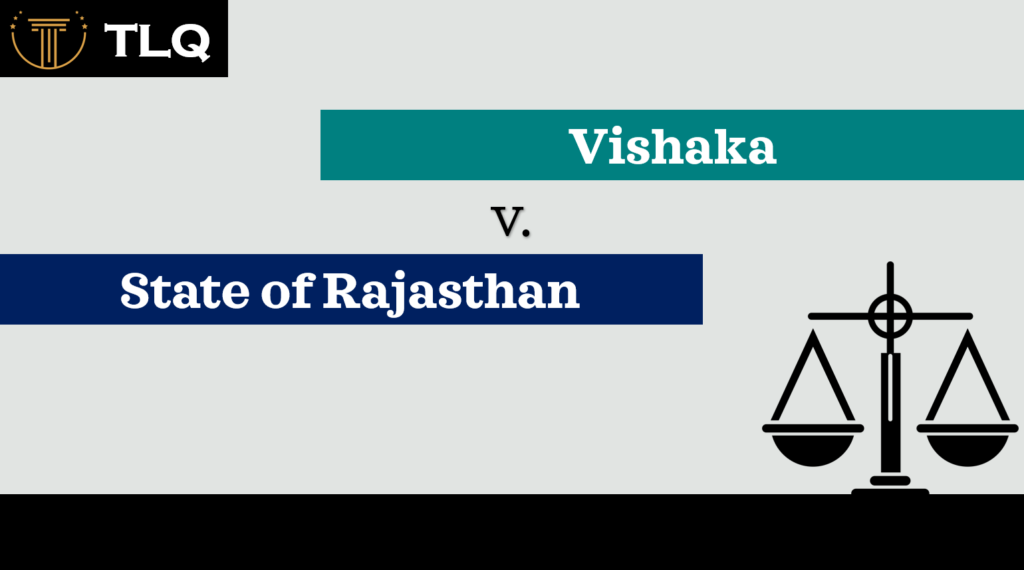Published On: 20th April, 2024

-
Anuradha Bhasin Vs Union of India [WP (c) No. 1301 of 2019]
Introduction:
This case was a landmark judgment delivered by the Supreme Court of India in January 2020. It dealt with the crucial issue of Internet Shutdowns and their impact on Fundamental Rights. In 2019, the Jammu and Kashmir region witnessed widespread protests following the abrogation of its special status (Article 370). The government imposed internet shutdowns in that region disrupting communication and access to information.
Facts:
The petitioners including Journalist Anuradha Bhasin challenged the practice of internet shutdowns imposed by the government in Jammu and Kashmir following the abrogation of Article 370 of the Constitution of India. They argued that shutdowns violated their Fundamental Rights to Freedom of Speech and Expression, Right to Trade or Profession and Right to Information.
Arguments:
- Petitioner:
- Internet access is a Fundamental Right protected under Article 19(1)(a) and Article 19(1)(g) as Freedom of speech and expression and Freedom to carry any trade or profession respectively.
- Indiscriminate internet shutdowns violate these fundamental rights and are disproportionate measures to maintain law and order.
- The government’s actions lacked transparency and accountability, as the orders for shutdowns were not made public.
- Respondent:
- Internet shutdowns are necessary to maintain law and order and prevent the spread of misinformation and incitement to violence in sensitive situations.
- The government has the power to restrict Fundamental Rights under reasonable restrictions as per Article 19(2) of the Constitution of India.
Judgment
The Supreme Court recognized access to the Internet as a Fundamental Right under Article 19(1)(a) of the Constitution of India, which guarantees freedom of speech and expression. The Apex Court laid down comprehensive guidelines for issuing Internet suspension orders, emphasizing the need for:
- Proportionality: Internet shutdowns can only be imposed when there is a grave threat to public safety and no alternative measures are available. The restrictions must be proportionate to the situation and not excessively broad.
- Procedural safeguards: Orders must be based on specific reasons(in writing), issued by competent authorities, and accessible to the public. These orders must be subject to Judicial Review.
- Review mechanism: A designated committee should be established to review the necessity of the Shutdown periodically and recommend its revocation if necessary.
Analysis:
The Anuradha Bhasin Judgment has been hailed as a significant step towards protecting online freedom in India. It has provided a legal framework for challenging arbitrary internet shutdowns and has forced the government to be more accountable for its actions. However, concerns remain regarding the continued use of internet shutdowns in India, and there have been instances where the government has not fully complied with the guidelines laid down by the Supreme Court.
In May 2023, the Supreme Court granted liberty to the Union Government to file its response to an application seeking compliance with the Anuradh Bhasin Guidelines. However, on December 7th, 2023, the Court was not inclined to hear the matter and dismissed the application as withdrawn. This ongoing debate highlights the importance of continued vigilance in protecting internet freedom and ensuring that the guidelines set forth in the Anuradha Bhasin Judgment are effectively implemented. Its interpretation of fundamental rights governing the freedom of speech, assembly, and movement is well-neigh perfect.
-
Faheema Shirin Vs State of Kerala [WP (c) No. 19716 of 2019]
Introduction:
In a landmark and extremely deserving judgment titled Faheema Shirin vs. the State of Kerala on September 2019, the Kerala High Court took a giant step forward by simply and convincingly stating that the right to access the Internet is a fundamental right that forms part of the right to privacy under Article 21 of the India Constitution. This excellent ruling was made in response to a student petition that questioned the arbitrary restrictions on cell phone use in the dorm.
Facts:
In the present case, a 3rd semester BA student at Sree Narayana Guru College who was residing at the Women’s Hostel of the college, brought the challenge against the new regulations which restricted the use of mobile phones within the women’s hostel from 6 pm to 10 pm, aggrieved by her expulsion from the hostel regarding the challenge, filed this Writ Petition. The petitioner, Faheema Shirin, claimed that the laws limiting cell phone use and requiring owners to turn them into the warden violated her right to privacy, her right to an education, and her freedom of speech. The petitioner further claimed that the new rules are discriminatory since they are limited to the women’s hostel, in violation of UGC Guidelines Clause 5, which forbids discrimination on the basis of gender.
The restriction was said to be arbitrary and hinder the Education of female students directly violating the Convention on Elimination of all Forms of Discrimination Against Women (CEDAW), and the Universal Declaration of Human Rights (UDHR).
Judgement:
The court made clear that the restriction is neither appropriate nor necessary to support the goal.
The misuse of the Internet via mobile can be even before 6pm and 10 pm, before and after the study time. It can happen with laptops too. Moreover, the court observed that the college students were adults capable of taking responsibility for their studies regarding how and when to study and said that the students should be allowed to use their mobile phones “to acquire knowledge from all available sources in order to achieve excellence and enhance quality and standard of education”.
The court further called upon “States to promote digital literacy and to facilitate access to information on the Internet, which can play an important role in facilitating the promotion of the right to education”.
Analysis:
The judgment read the right to have access to the Internet becomes the part of Right to Education guaranteed under Article 21A as well as the Right to Privacy under Article 21 of the Constitution of India. Everyone has the fundamental right to the Internet, and no one should have that right violated by arbitrary limitations, even if those restrictions are put in place at their parents’ request. Even the college authority should not ignore the boons of digital education.
Moreover, in the case of Sabu Mathew George Vs Union of India and others, the Supreme Court observed that the Fundamental Right of expression includes “the right to be informed and the right to know and the feeling of protection of expansive connectivity that the Internet offers on the click of a button”. Further, the United Nations General Assembly Regulations also encourage the state to promote digital literacy to facilitate access to the information provided on the Internet. In the case of K.S Puttaswamy Vs Union of India and others, the Apex Court held that the Right to Privacy is an intrinsic part of the right to life, personal liberty and dignity and hence a Fundamental Right under Part-III of the Constitution of India.
Finally, the Internet is the most effective instrument we have for globalization. It has helped us to transform the entire world into a Global Village. In the light of increasing users and benefits to all sections of society, the recognition of the Right to Access Internet as a substantive right in itself by the High Court of Kerala is a much-needed step and welcomed.





